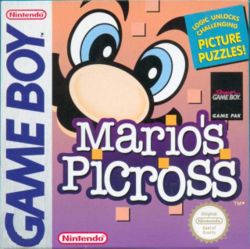Difference between revisions of "Mario's Picross"
Jump to navigation
Jump to search
m (Maro's Picross moved to Mario's Picross: Misspelled name) |
|||
| Line 15: | Line 15: | ||
=Gameplay= | =Gameplay= | ||
| − | |||
| − | |||
| − | |||
| − | |||
The object of the game is to mark certain tiles in order to create a picture. Along the games grids are numbers to give players a hint about how to fill in the spots. For example, if it says "2 5", that means there is a group of two tiles and a group of five tiles that need to be blacked out. | The object of the game is to mark certain tiles in order to create a picture. Along the games grids are numbers to give players a hint about how to fill in the spots. For example, if it says "2 5", that means there is a group of two tiles and a group of five tiles that need to be blacked out. | ||
The player is given 30 minutes to complete the puzzle and each mistake costs the player more time. | The player is given 30 minutes to complete the puzzle and each mistake costs the player more time. | ||
| + | |||
| + | =Legacy= | ||
==Sequels== | ==Sequels== | ||
Revision as of 09:02, 12 September 2007

| |
| Mario's Picross | |
| Developer | Jupiter |
| Publisher | Nintendo |
| System | Gameboy |
| Release Date | Gameboy JP March 14, 1995 US 1995 EU 1995 |
| Rating | ESRB: K-A |
Mario's Picross is a Gameboy version of Picross.
Gameplay
The object of the game is to mark certain tiles in order to create a picture. Along the games grids are numbers to give players a hint about how to fill in the spots. For example, if it says "2 5", that means there is a group of two tiles and a group of five tiles that need to be blacked out.
The player is given 30 minutes to complete the puzzle and each mistake costs the player more time.
Legacy
Sequels
Super Mario's Picross and Mario's Picross 2 were both developed, but only released in Japan.